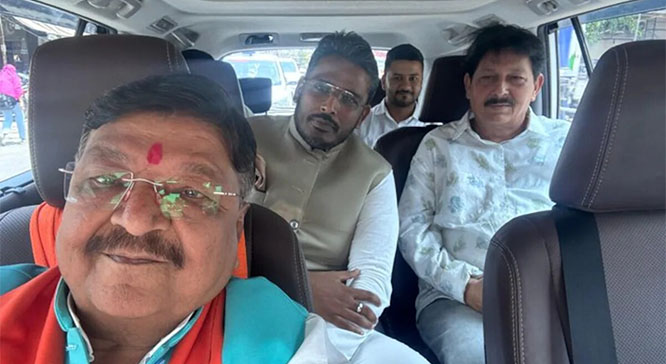New Delhi, Jan 18: In the backdrop of growing unease in Sino-India ties, India today said it has been trying to convince the Chinese government that its ascent is not harmful to the rise of China and that both countries should be sensitive on matter relating to sovereignty.

"What we are trying to do is to convince China that our rise is not harmful to China's rise just as China's rise need not be to India's rise," he said at the gathering attended by representatives from across the world.
Chill has set in Sino-India ties following China's opposition to India's membership at the Nuclear Suppliers Group as well as Beijing blocking India's move at the UN to designate Masood Azhar as a global terrorist.
During the interactive session, during which he touched upon a vast array of subjects concerning international relations, Jaishankar said the SAARC has been made "ineffective due to the insecurity of one member".
Identifying terrorism as the most "pervasive and serious challenge" to international security, the Foreign Secretary said developing a serious global response to it is of the highest priority but rued that it is hard to do.
On ties with China, Jaishankar said there has been overall broadening of ties, especially in areas of business and people-to-people contact, but they have been overshadowed by differences on certain political issues.
"But it is important for the two countries not to lose sight of the strategic nature of their engagement, or falter in their conviction that their rise can be mutually supportive," he said.
Replying to a question on CPEC, he said both countries should show sensitivity to each other's sovereignty.
"China is a country which is very sensitive on matters concerning its sovereignty. So we would expect that they would have some understanding of other people's sensitivity on their sovereignty," he said.
Jaishankar said the CPEC passes through a "piece of land that we call Pakistan-occupied-Kashmir which is territory belongs to India and which is illegally occupied by Pakistan".
He said the project has been undertaken without consultation with India and that its sensitivity and concerns towards it are natural.
On India's overall ties with China, he said both the countries have opened up significantly since 1945.
"In a sense, both of us, if you step back and look at it, are opening up a very close international order. When people talk about change since 1945, I think two big changes are really India and China.
"I would say if China had not opened up the international order the way it did, I think it would be much harder today for India also to exploit those phases. There is a high degree of shared interests," he said.
On SAARC, in an obvious reference to Pakistan's obstructionist approach, he said, "We hope to partially remedy this through the BBIN (Bangladesh, Bhutan, India, Nepal) sub-regional grouping.
"It is also our expectation that the current level of enthusiasm among members of BIMSTEC can be channelled towards more far-reaching initiatives."
Jaishankar said it is important for India and China not to lose sight of the strategic nature of their engagement, or falter in their conviction that their rise can be mutually supportive.
Talking about geo-political issues, he said the world in 2017 is marked by "unevenness, possibilities and uncertainties" and that US seemed ready to change the terms of its engagement with the world.
"Relations between US and Russia could undergo a transformation that we may not have seen since 1945. Its dimensions, leave alone implications, are hard to predict.
Europe, engrossed in multiple domestic challenges and reconfiguring itself, signals less appetite for more distant politics, even as it watches these developments," he said.
The Foreign Secretary said "instead of being driven by headlines – or tweets – let's look at what's different and what is not."
"Terrorism remains the most pervasive and serious challenge to international security. Developing a serious global response is of the highest priority, yet hard to do. Climate change is an existential challenge on which some common ground exists, that needs to be consolidated," he said.
Talking about Asia, he said various disputes including in maritime sphere acquired salience in the last few years.
"Broadly speaking, the growth in China's power and its expression abroad remain a dynamic factor in Asia," he said.
In the Western world, he said, optimism that trade and investment overcome political divides has also faded.
"More dangers than convenience are perceived from connectivity. And there is a lack of purpose in confronting global challenges like terrorism, though some important exceptions should be acknowledged. The world has not just got flatter. Suddenly, one part of it is also more inward looking; in some ways, more tired," he said.
He said Asia is facing a host of challenges including emerging multipolarity, heightened nationalism and disputed boundaries among others.
Referring to financial slowdown, Jaishankar said globalisation has not stopped and cannot stop, just because "someone somewhere has called 'time out'".
He observed that an immediate precursor to the current global situation was in the aftermath of the 2008 financial crisis and in many ways, this laid the basis for a more multipolar world.
"Ironically, while the Western-led G8 gave way to the more representative G20, the more diverse UNSC remained as resistant to change as before," he said.
On India's foreign policy, the Foreign Secretary said the country has actually broadened its footprint and intensified its investment, trade and technical activities in an "unprecedented manner".
"The rapid growth of Chinese power, the strengthening of India's position, the sharper role of Russia, the activity of Japan, the divisions in the Gulf, the interests of Europe, and the entrenched position of the United States have not made this calculus an easy one," said the Foreign Secretary.







Comments
Add new comment